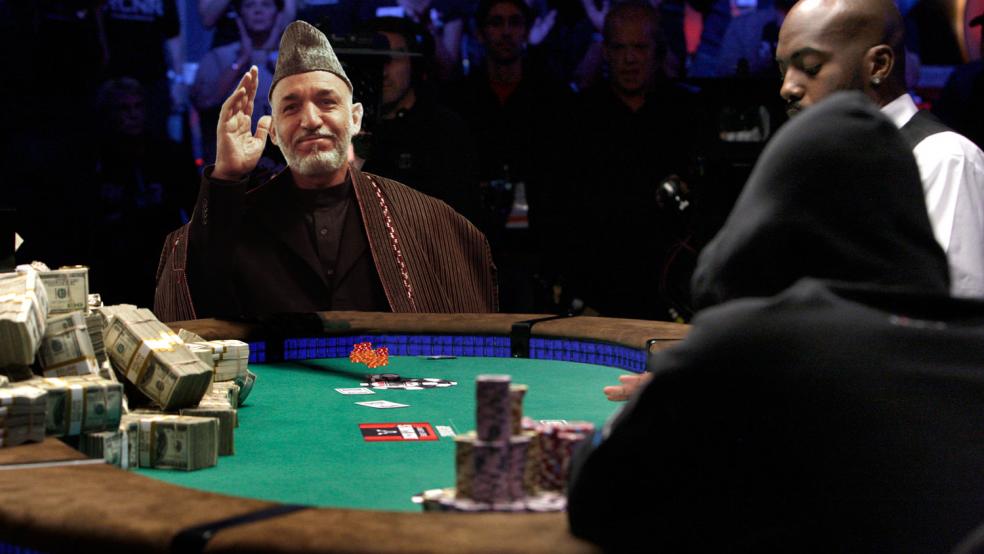All those hoping for an end to the ongoing security agreement standoff between Afghanistan and the United States awoke to some good news Thursday: German Foreign Minister Frank-Walter Steinmeier, who had just returned to Berlin after meeting with Afghan President Hamid Karzai, said that Karzai told him he would sign the agreement.
“He said to me very clearly: The deal has been negotiated, it would not be amended, and “Steinmeier told German parliament on Thursday afternoon. “I was pleased that Karzai said very clearly that Afghanistan would in any case sign.”
Related: The Last Stand of Hamid Karzai
Steinmeier’s statement, however, came with one important caveat: Karzai gave the German foreign minister no indication when he would sign the deal.
Karzai’s statement to Steinmeier is his latest move in the seemingly endless game of poker being played between the United States and Afghanistan. Earlier this week, the Pentagon said it would wait and negotiate with Karzai’s successor, who is expected to be elected in April.
DOD took this step because Karzai has continually delayed signing the deal. Yet Karzai then tells America’s most important European ally that he will sign the deal, making Berlin the go-between.
“He’s being nicer to the Germans than he is to the United States. He has a good rapport with the Germans,” said Lisa Curtis, a senior researcher at the Heritage Foundation. “I don’t see this as a breakthrough that Karzai is going to sign this imminently. He’s saying it in a more diplomatic, kinder way to the Germans.”
Related: Hamid Karzai - From Afghan Hope to Afghan Villain
“Thumbing His Nose”
As always, though, there was a twist. Just hours later, Karzai released 65 prisoners from Bagram Prison outside of Kabul. The U.S. has repeatedly objected to such a move, claiming that some of the prisoners have killed U.S. soldiers. But Karzai, speaking in Turkey, dismissed American concerns.
“Afghanistan is a sovereign country. If the Afghan judicial authorities decide to release a prisoner, it is of no concern to the U.S. and should be of no concern to the U.S.,” Karzai said. “I hope that the United States will stop harassing Afghanistan's procedures and judicial authority; and I hope that the United States will now begin to respect Afghan sovereignty.”
The U.S. embassy in Kabul released a statement calling Karzai’s decision “deeply regrettable.” It said that the Afghan government “bears responsibility for the results of its decision.” It also urged the Afghan government “to make every effort to ensure that those released do not commit new acts of violence and terror.”
Related: Is Afghan President Hamid Karzai Off His Meds?
“It’s further thumbing his nose at the United States,” Curtis of the Heritage Foundation said. “He obviously is extremely frustrated with the United States or feels it’s going to gain him something politically by taking this hardline position.”
Losing Congress
Karzai has already lost the White House. When director of National Intelligence, James Clapper, said earlier this week, “I don’t believe President Karzai is going to sign [the agreement]” it sent a clear message that whatever was left of the well of trust between the Obama administration and Karzai had run dry.
There are now growing signs that even those within Congress who have supported the U.S. mission in Afghanistan are losing faith.
“President Karzai, in my view, is single-handedly destroying this relationship,” Sen. Lindsey Graham (R-SC), a longtime supporter of continuing the Afghan mission, said Tuesday. He vowed to “push back as hard as possible” against Karzai.
Sen. Carl Levin (D-MI), another politician who has backed the Afghan war, also appeared to be wavering in his support of Karzai. He said the Afghan president “has made a series of statements so inflammatory that they are undermining public support in the United States for continuing efforts in Afghanistan.”
The prisoner release will further damage ties between Washington and Afghanistan, according to Curtis.
“U.S. officials are quite ready to show him the door and he’s really blown it in terms of any respect he might have had in Congress or the administration,” she said.
Top Reads from the Fiscal Times:





